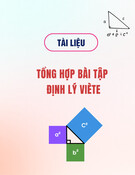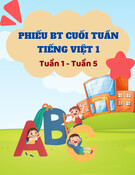
TRƯỜNG THCS MẠO KHÊ II
ĐỀ CƯƠNG ÔN TẬP CUỐI HỌC KỲ 2 MÔN TIẾNG ANH LỚP 8
NĂM HỌC : 2022-2023
A. LÝ THUYẾT
QUY TẮC ĐÁNH DẤU TRỌNG ÂM
1.Đánh dấu nhấn âm trên từ có âm kết thúc là -ic và -al
*Khi thêm một hậu tố -ic vào một từ thì sẽ làm từ đó thay đổi cách nhấn âm. Ta sẽ nhấn âm
trước ngay hậu tố thêm vào. Hay nói cách khác ta sẽ nhấn âm ngay trước hậu tố -ic của
một từ.
Ex: atom —► a’tomic; po' etic
*Khi thêm một hậu tố -al vào một từ thì sẽ không làm thay đổi cách nhấn âm của từ đó.
Ex: 'music —> 'musical
Lưu ý: Nếu một từ có thể dùng cả hai hậu tố: một hậu tố là -ic và một hậu tố khác là -al, thì
giữa hai từ này có cùng một cách nhấn âm.: Ex: e'conomy —► economic —>
economical
botanic —► bo'tanic —► bo’tanical
2.Khi thêmtiền tố là: -un/ -im( nghĩa phủ định) vào từ thì không làm thay đổi vị trí
trọng âm của từ.
Ex. unim’portant, impo’lite, un’happy, unpo’lluted
-Đối với từ có 1 âm tiết thì trọng âm luôn rơi vào từ gốc.
Ex: fair- un’fair
3. Đối với từ mà tận cùng -logy và – graphy thì trọng âm được nhấn vào âm thứ ba kể từ
cuối trở lên.
Technology—►Technology Biology —► bi'ology geography—
►ge'ography
photography —►pho'tography apology —►a'pology ecology —► e'cology
4. Những từ tận cùng là -ity and -itive
Những từ có tận cùng là-ity and -itive , thì trọng âm đứng trước hậu tố
Ex: ‘possitive, oppor’tunity.
GRAMMAR ( NGỮ PHÁP )
I. Conditional sentences type 1. (Câu điều kiện loại 1)
1. Form
IFCLAUSE ( Mệnh đề If ) MAIN CLAUSE ( Mệnh đề chính )
Simple Present ( Thì hiện tại đơn )
If + S + V (s/es)
Simple Future ( Thì tương lai đơn )
S + will/ won’t + V ( bare infinitive )
S+ can/must/ may/ might+ V( bare infinitive )
Eg 1 If I have enough money, I will buy a big house.
( Nếu tôi có đủ tiền , tôi sẽ mua một ngôi nhà lớn ).
Eg 2 If you want to pass the exam, you must study harder.
( Nếu bạn muốn thi đỗ , bạn phải học hành chăm chỉ hơn ).
Eg 3 If she doesn’t want to be late, She must get up early.
( Nếu cô ấy không muốn bị muộn thì cô ấy phải dậy sớm ).
2. Usage

- Câu điều kiện loại 1 là câu điều kiện diễn tả tình trạng có thật ở hiện tại hoặc tương
lai.
Eg If you learn hard, you will pass the exam. Nếu bạn học chăm chỉ , bạn sẽ đỗ kỳ thi.
- Trong câu điều kiện loại 1, thì hiện tại đơn dùng trong mệnh đề If, còn thì tương lai đơn
được dùng trong mệnh đề chính.
Eg
If the factory continues dumping poison into the lake, all the fish and other aquatic animals
will die
Nếu nhà máy tiếp tục thải chất độc xuống hồ, thì tất cảloài cá và các sinh vật dưới nước sẽ
chết.
Chú ý Thì hiện tại đơn có thể được dùng trong mệnh đề chính để diễn tả một điều
kiện luôn đúng
II. Conditional sentences type 2.
1.Form.
IFCLAUSE (Mệnh đề If ) MAIN CLAUSE ( Mệnh đề chính )
If +S + V-ed/2
If + S + were
S + would / could/might + V(infinitive)
S + wouldn’t / couldn’t +V (infinitive)
Eg 1 If I became rich , I would spend all my time travelling.
Nếu tôi giàu, tôi sẽ dành tất cả thời gian để đi du lịch.
2.Usage
- Câu điều kiện loại 2 là câu điều kiện không có thật thường dùng để nói lên sự tưởng
tượng của người nói, hay diễn đạt một lời khuyên ( Điều kiện không thể xảy ra ở hiện
tại hoặc tương lai ).
If I were you, I would buy that bike.
Nếu tôi là bạn tôi sẽ mua chiếc xe đạp đó.
Chú ý Trong mệnh đề không có thật ở hiện tại, chúng ta có thể dùng were thay cho
was trong tất cả các ngôi trong mệnh đề If.
Eg If I were you, I would study English hard.
Nếu tôi là bạn, tôi sẽ học Tiếng Anh chăm chỉ hơn.
III .The past perfect .( Thì quá khứ hoàn thành )
1.Form
a) Thể khẳng định (Affirmative form) S + had + p.p
Eg: I had left my wallet at home.
b) Thể phủ định (Negative form) s + hadn’t + p.p
Eg: The house was dirty. They hadn’t cleaned it for weeks.
c) Thể nghi vấn (Interrogative form} Had + s + p.p?
Eg: Where had he put his wallet?
2. Cách dùng: Thì quá khứ hoàn thành được dùng để diễn tả:
a) Hành động hoặc trạng thái đã xảy ra và đã kết thúc trước một thời điểm trong quá
khứ.
By the end of last semester, we had finished Book IV.
Cuối học kỳ trước, chúng ta đã hoàn thành quyển 4.
Before his mother came back, he had tidied up the whole room.
b) Hành động đã xảy ra và kết thúc trước một hành động quá khứ khác (hành động
xảy ra trước dùng quá khứ hoàn thành, hành động xảy ra sau dùng quá khứ đơn).

I had seen him before he saw me.
c) Hành động đã xảy ra và kéo dài đến một thời điểm nào đó trong quá khứ.
Ex: By nine o'clock, we had studied for three hours in the classroom.
Chúng tôi đã học 3 tiếng đồng hồ trong lớp từ lúc 9 giờ.
I had worked for several hours when he called. She told me that she had walked
for two hours.
*** LƯU Ý:
Dấu hiệu nhận biết:
Trong câu thường có các từ: before(TRƯỚC KHI ), after(sau khi), when(khi), by the
time(vào thời điểm), by the end of + time in the past …
Ex: *When I got up this morning, my father had already left.
* By the time S. Past, Past Perfect.
By the time I met you, I had worked in that company for five years.
* S. Past After Past Perfect
They went home after they had eaten a big roasted chicken.
(Họ về nhà sau khi đã ăn một con gà quay lớn.)
After I had bought a new pen, I found my pen
*Past PerfectBeforeS.past
She had done her homework before her mother asked her to do so.
Before he arrived his office, his secretary had gone out
IV. Future continuous( THÌ TƯƠNG LAI TIẾP DIỄN)
1.Form
(+) S + will/ shall + be + V-ing
Ex: I / we shall be working
You / he, she , it, they will be + working
(-) S + won’t / shan’t + be + V-ing
Ex: I / we shan’t be working
You / he, she , it, they won’t be + working
(?) Shall + S + be + V-ing…?
Ex: Shall I / We + be working?
Will you/ he/ she /it / they be working?
2.Usage:
Thì tương lai tiếp diễn được dùng để:
- .Diễn tả một hành động kéo dài trong một thời gian nào đó ở tương lai
Ex: By this time torromow, They will be playing volleyball
- .Diễn tả một hành động sẽ xảy ra trong tương lai mà thời điểm không cần xác định
ex:I’ll be visting her tomorrow
V. Verb to –Infinitive / V- Ving
Nếu chúng ta muốn tuân theo một động từ với một hành động khác, chúng ta phải sử dụng
một danh động từ hoặc một động tử (to infinitive)
Verb + to-infinitive ( V + to V)
Ex: I want to go to the market.
- Một số động từ thông thường tuân theo bởi to – Ininitive
Choose, decide, plan, love, hate, prefer, try, want , need
* Note:một số động từ như: love, hate, prefer có thể tuân theo cả hai : V-ing và to – V
mà không đổi nghĩa

VI. PASSIVE VOICE (THỂ BỊ ĐỘNG)
1.CÂU BỊ ĐỘNG (Passive sentences):
Câu bị động là câu trong đó chủ ngữ là người hay vật nhận hoặc chịu tác động của hành
động.
Eg: (A) I asked a question.
→(P) : A question was asked by me. Một câu hỏi được hỏi bởi tôi.
B. Cách chuyển từ câu chủ động sang câu bị động:
* Thể khẳng định (Affirmative form) S + be + p.p (Past Participle) + (by + 0)
Ex: The car was washed by your father.
S be + p.p O
* Thể phủ định (Negative form) S + be not + p.p + (by + 0)
Ex: The car was not washed by your father.
s be + p.p o
* Thể nghi vấn (Interrogative form) Be + S + p.p + (by + 0)?
Ex: Was the carwashed by your father?
Be S p.p o
Động từ be ở đây phải phù hợp với chủ ngữ cũng phải thể hiện được thì cua câu. Khi dịch
nghĩa câu bị động, ta dịch là “bị, được” tùy vào câu, ngữ cảnh mà ta chọn nghĩa cho phù
hợp.
VII. CÂU GIÁN TIẾP (REPORTED SPEECH)
1. Định nghĩa.
Định nghĩa Ví dụ
- Câu trực tiếp (Direct Speech) là chính xác lời của ai đó.
Chúng ta thường dùng dấu “ ” để trích dẫn lời nói trực
tiếp.
- Câu tường thuật (hay còn gọi là câu gián tiếp) là câu
thuật lại lời nói trực tiếp do một người khác phát biểu.
- They said, “We will visit her”. (Direct Speech)
→They said (that) they would visit her. (Reported Speech/
Indirect Speech)
2. CÂU TRẦN THUẬT GIÁN TIẾP (Reported Statement)
Khi muốn thay đổi một câu trần thuật trực tiếp sang 1 câu trần thuật gián tiếp, chúng ta dùng động từ
‘say/tell’ để giới thiệu. Đồng thời cần áp dụng các quy tắc sau:
a. Thay đổi thì của động từ.
* Nếu động từ giới thiệu ở thì hiện tại (say/tell) thì động từ trong câu gián tiếp giữ nguyên thì trong
câu trực tiếp.
Ví dụ: “ I always drink coffee in the morning”, she says
→ She says that she always drinks coffee in the morning.
* Nếu động từ giới thiệu ở thì quá khứ (said/told) thì động từ trong câu gián tiếp cần thay đổi như
sau:
Thì trong lời nói trực tiếp Thì trong lời nói gián tiếp
Hiện tại đơn
“I like sciences”
→ Quá khứ đơn.
He said (that) he liked sciences

Hiện tại tiếp diễn
“I am staying for a few days”
→Quá khứ tiếp diễn
She said (that) she was staying for a few days.
Hiện tại hoàn thành
“Nick has left”
→ Quá khứ hoàn thành
She said (that) Nick had left
Quá khứ đơn
“Nick left this morning”
→ Quá khứ hoàn thành
She told me (that) Nick had left that morning
Quá khứ tiếp diễn
“I was doing my homework”
→ Quá khứ tiếp diễn/ Quá khứ hoàn thành tiếp diễn
She said (that) she was doing her homework /She had
been doing her homework
Will
“Man will travel to Mars”
→Would
He said (that) man would travel to Mars.
Can
“We can swim”
→ Could
They told us (that) they could swim.
May
“We may live on the moon”
→Might
He said (that) they might live on the moon.
b. Đổi ngôi của đại từ nhân xưng, tính từ và đại từ sở hữu.
Trong lời nói trực tiếp Trong lời nói gián tiếp
I → he/she
We → they
You → I/he/she
My → his/her
Our → their
Your → my/his/her
Mine → his/hers
Ours → theirs
c. Thay đổi các trạng từ chỉ thời gian nơi chốn.
Trạng từ trong câu trực tiếp Trạng từ trong câu gián tiếp
Now →then
Today →that day
Here →there
this week →that week
tomorrow →the following day/the next day
yesterday →the day before/the previous day
last month →the month before/the previous month
Tonight →that night
Ago →before
next week →the following week/the week after
These →those
Ví dụ:
He said to me, “I and you will go with her father next week”
He told me (that) he and I would go with her father the following week.
S + said (to sb)/ told sb + ( that) + S + V(-lùi 1 thì)
Note: Khi động từ dẫn nhập chia ở thì hiện tại, không lùi thì trong câu trần thuật
She says “ I am very hungry”
She says she is very hungry.
B. PRACTICE
I. Choose the word that has different sound in the underlined part
1. A bury B. unique C. united D. student
2. A. surface B. station C. illustrate D. natural
3. A. rage B. damage C. shake D. plane
4.A. invited B. flooded C. cleaned D. communicated
5. A. precise B. system C. Mars D. snail
II.Circle the word with a different stress pattern from theothers.





![Bài tập so sánh hơn và so sánh nhất của tính từ [kèm đáp án/mới nhất]](https://cdn.tailieu.vn/images/document/thumbnail/2025/20250808/nhatlinhluong27@gmail.com/135x160/77671754900604.jpg)
![Tài liệu tham khảo Tiếng Anh lớp 8 [mới nhất/hay nhất/chuẩn nhất]](https://cdn.tailieu.vn/images/document/thumbnail/2025/20250806/anhvan.knndl.htc@gmail.com/135x160/54311754535084.jpg)




![Tài liệu Lý thuyết và Bài tập Tiếng Anh lớp 6 [Mới nhất]](https://cdn.tailieu.vn/images/document/thumbnail/2025/20250802/hoihoangdang@gmail.com/135x160/18041754292798.jpg)




